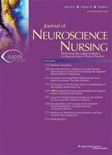
JOURNAL OF NEUROSCIENCE NURSING
Scope & Guideline
Shaping Practice with Pioneering Research
Introduction
Aims and Scopes
- Neuroscience Nursing Practice:
The journal emphasizes the importance of specialized nursing care for patients with neurological conditions, including stroke, traumatic brain injuries, and neurodegenerative diseases. It seeks to enhance the quality of care through innovative practices and protocols. - Interdisciplinary Collaboration:
Many papers advocate for a multidisciplinary approach in managing neurological patients, highlighting the collaboration between nurses, physicians, therapists, and other healthcare professionals. - Research and Evidence-Based Practice:
The journal encourages rigorous research methodologies and the application of evidence-based practices to improve patient outcomes in neuroscience nursing. - Patient and Caregiver Education:
Educational initiatives aimed at patients and caregivers are a core focus, ensuring that they are well-informed about their conditions and care processes. - Delirium and Cognitive Function:
Recent studies have increasingly focused on delirium, cognitive assessments, and their implications for nursing practice in critical care settings. - Quality Improvement in Care:
The journal supports continuous quality improvement initiatives within neuroscience nursing, aiming to enhance operational efficiency and patient safety.
Trending and Emerging
- Telemedicine and Remote Care:
The increasing incorporation of telemedicine in neurological care has been a significant trend, particularly following the COVID-19 pandemic, which has prompted innovative approaches to patient monitoring and treatment. - Mental Health and Neurological Disorders:
There is a growing emphasis on the intersection of mental health and neurological disorders, with studies exploring the psychological impact of conditions such as stroke and traumatic brain injury. - Simulation-Based Education:
The use of simulation in nursing education is trending, with research showcasing its effectiveness in preparing nurses for real-world scenarios in neuroscience care. - Interprofessional Education and Practice:
An emerging theme is the focus on interprofessional education, which prepares nursing professionals to work collaboratively with other healthcare disciplines, enhancing patient care outcomes. - Patient-Centered Care Models:
The shift towards patient-centered care models is gaining traction, focusing on personalized treatment plans that consider the unique needs of each patient.
Declining or Waning
- Traditional Stroke Protocols:
The focus on traditional stroke management protocols has decreased, possibly due to the emergence of more innovative and comprehensive approaches to stroke care, such as telemedicine and patient-centered care models. - Basic Nursing Skills:
Papers that emphasize basic nursing skills in neuroscience have become less frequent, as the field shifts towards more advanced practices and technologies in patient care. - Generalized Pain Management:
The discussion surrounding generalized pain management in neurological patients has waned, with a shift towards more specific studies on pain management tailored to individual neurological conditions. - Single-Disease Focus:
Research concentrating solely on single neurological diseases (like stroke or Alzheimer's) is becoming less common, with a trend towards integrated studies that address multiple conditions or comorbidities.
Similar Journals
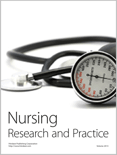
Nursing Research and Practice
Empowering research to transform nursing practices.Nursing Research and Practice, an esteemed open-access journal published by HINDAWI LTD, serves as a vital resource in the field of nursing, providing a platform for the dissemination of innovative research and practice methodologies. With its ISSN 2090-1429 and E-ISSN 2090-1437, this journal has maintained a commendable presence in the academic community since its inception in 2010. Based in Egypt, it is positioned within the Q2 category of Nursing (miscellaneous) and ranks #47/139 in General Nursing according to Scopus, placing it in the 66th percentile. The journal is committed to advancing nursing science and facilitating an evidence-based approach to practice, encouraging contributions that explore the full spectrum of nursing discipline. As a vital reference for researchers, healthcare professionals, and students alike, Nursing Research and Practice not only keeps its audience informed but also promotes innovative practices to enhance patient care across diverse settings.
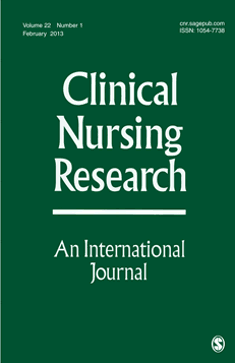
Clinical Nursing Research
Fostering innovation in nursing scholarship since 1992.Clinical Nursing Research is a premier academic journal dedicated to advancing the discipline of nursing through rigorous research and evidence-based practice. Published by SAGE Publications Inc, this journal has been a cornerstone in the field since its inception in 1992, with a commitment to providing high-quality research that informs clinical practice and nursing education. With an impressive Scopus ranking of #40 out of 139 in the general nursing category and a percentile rank of 71, it represents a significant contribution to the nursing literature. Although not an open-access journal, Clinical Nursing Research facilitates access through institutional subscriptions, ensuring that critical findings are disseminated widely. The journal’s objectives include fostering innovation and promoting best practices in nursing, making it an indispensable resource for researchers, practitioners, and students alike. As it continues to evolve through 2024 and beyond, Clinical Nursing Research remains at the forefront of nursing scholarship, addressing the complexities of healthcare in a rapidly changing world.

Journal of Pediatric Hematology-Oncology Nursing
Advancing pediatric care through innovative nursing research.The Journal of Pediatric Hematology-Oncology Nursing, published by SAGE Publications Inc, serves as a premier platform for advancing the field of pediatric nursing, particularly in the critical realms of hematology and oncology. With an ISSN of 2752-7530 and an E-ISSN of 2752-7549, this journal has quickly established its significance, achieving commendable rank status in various nursing specialties, including a Q1 placement in Advanced and Specialized Nursing as of 2023. It provides critical insights and evidence-based research across its converged years from 2022 to 2024, ensuring that professionals in the field remain at the forefront of best practices and innovations. The journal is especially relevant for nurses, medical professionals, and researchers aiming to improve patient outcomes in pediatric care. With open access options, it invites a broad readership to engage with its content, thus fostering collaboration and knowledge sharing in this vital area of healthcare.

Investigacion y Educacion en Enfermeria
Empowering healthcare through innovative education.Investigacion y Educacion en Enfermeria, published by Universidad de Antioquia, Facultad de Enfermería, stands as a pivotal open-access journal since 1983, contributing significantly to the field of nursing and healthcare education within Colombia and beyond. With its ISSN 0120-5307 and E-ISSN 2216-0280, this journal aims to foster the dissemination of high-quality research, aiming to enhance nursing practices and education aligned with a wide array of domains including Community and Home Care, Family Practice, Geriatrics, and Maternity and Midwifery. The journal's impressive performance in the 2023 Scopus rankings places it in the top quartiles in several categories, reflecting its importance and influence, particularly in Nursing and Health Sciences. By encouraging collaboration and dialogue among researchers, practitioners, and students, Investigacion y Educacion en Enfermeria aspires to serve as an essential resource for advancements in nursing education and service delivery, making vital contributions to the evolving landscape of healthcare.
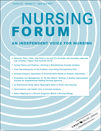
NURSING FORUM
Exploring Evidence-Based Practices for Optimal Patient Care.NURSING FORUM, published by Wiley-Hindawi, is a premier journal dedicated to advancing the knowledge and practice of nursing across diverse contexts. With an ISSN of 0029-6473 and E-ISSN 1744-6198, this esteemed journal has been a vital source of scholarly communication since its inception in 1961, serving researchers, practitioners, and educators in the nursing field. Recognized for its impactful contributions, it holds a prestigious Q1 ranking in Nursing (miscellaneous) and ranks #18 out of 139 in Scopus' General Nursing category, placing it in the top 87th percentile of its field. With its publication continuity from 1961 to 2024, NURSING FORUM promotes innovative research, evidence-based practices, and critical discourse essential for the nursing profession. This journal not only provides access to cutting-edge studies but also fosters a collaborative platform for healthcare professionals and academics to engage and share insights. Whether you are a seasoned researcher or a nursing student, NURSING FORUM is your essential gateway to the latest advancements and discussions that shape the future of nursing.
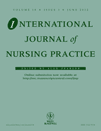
International Journal of Nursing Practice
Connecting academia and practice for a healthier tomorrow.International Journal of Nursing Practice, published by WILEY, is a premier academic journal dedicated to the field of nursing, with a keen emphasis on innovative nursing practices and advancements in healthcare. Established in 1995, the journal has successfully bridged a vital gap in nursing research and practice, featuring rigorous peer-reviewed articles that cater to both academic and clinical audiences. Rated as a Q1 journal in Nursing (miscellaneous) for 2023, it ranks at an impressive #29 out of 139 in General Nursing on Scopus, placing it firmly within the top 21% of its category. The journal serves as an essential resource for nursing professionals, researchers, and students alike, fostering evidence-based practices and enriching the global discourse in nursing. With an increasing focus on interdisciplinary work, the International Journal of Nursing Practice aims to enhance the quality of care provided to patients and support the continuous education of healthcare providers. Stay updated with cutting-edge research and share your contributions to this dynamic field!
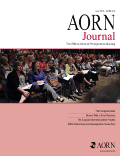
AORN JOURNAL
Elevating Standards in Perioperative Education and Practice.AORN JOURNAL, a reputable publication in the field of Medical and Surgical Nursing, has been at the forefront of nursing education and practice since its inception in 1963. Published by WILEY, this peer-reviewed journal serves as an essential resource for nurses, educators, and healthcare professionals seeking to enhance their knowledge and skills in perioperative care. With an impressive ranking of 15th out of 26 in its category according to Scopus, and a Q2 rating in the 2023 category quartiles, the AORN JOURNAL consistently provides high-quality research, innovative practices, and evidence-based guidance. While currently not an open-access journal, it offers valuable insights and practical solutions to complex challenges in surgical settings, making it a crucial tool for advancing the nursing profession. The journal's commitment to fostering excellence in patient care continues to empower professionals and students alike, ensuring they stay at the leading edge of medical knowledge and practice.
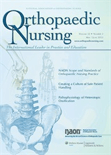
Orthopaedic Nursing
Empowering Nurses, Transforming OrthopaedicsOrthopaedic Nursing, published by Lippincott Williams & Wilkins, is a vital journal dedicated to advancing the knowledge and practice of orthopaedic nursing. With its ISSN 0744-6020 and E-ISSN 1542-538X, this journal has been a cornerstone in the field since its inception in 1981 and continues to disseminate groundbreaking research and critical insights through to 2024. The journal is categorized in the third and fourth quartiles across various nursing and medical disciplines, reflecting its niche but impactful presence within the realms of Advanced and Specialized Nursing, Medicine (miscellaneous), and Orthopedics and Sports Medicine. Although it operates under a traditional access model, the importance of its articles—addressing both theoretical and practical aspects of orthopaedic care—cannot be overstated. Researchers, practitioners, and students alike will find Orthopaedic Nursing an indispensable resource for enhancing their understanding of contemporary practices and the evolving landscape of patient care in orthopaedics.
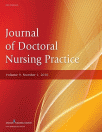
Journal of Doctoral Nursing Practice
Fostering excellence in doctoral nursing education and practice.The Journal of Doctoral Nursing Practice, published by SPRINGER PUBLISHING CO, serves as an essential platform for the dissemination of innovative research and best practices in nursing and health policy. With its ISSN 2380-9418 and E-ISSN 2380-9426, this journal is committed to advancing the field through rigorous peer-reviewed articles that contribute to both theoretical and practical advancements in doctoral nursing education and practice. Since its inception in 2016, the journal has provided a vital forum for scholarly work, currently holding a prestigious ranking of Q3 in Nursing (Miscellaneous) and Q4 in Health Policy. The journal emphasizes the significance of nursing research in influencing health policy and outcomes, making it a critical resource for researchers, practitioners, and students alike who aspire to enhance nursing practices and healthcare systems. With no Open Access option, access to its high-quality content reflects a commitment to academic rigor and integrity, ensuring that the work published is both impactful and credible.
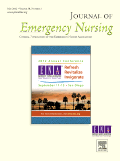
Journal of Emergency Nursing
Elevating Standards in Emergency Nursing ExcellenceJournal of Emergency Nursing, published by Elsevier Science Inc, serves as a premier platform for advancing the field of emergency nursing. Since its inception in 1975, this peer-reviewed journal has established itself as a vital resource for researchers, practitioners, and educators alike, with a notable impact factor and current ranking of #8 out of 32 in the Emergency Nursing category, placing it in the 76th percentile. The journal's commitment to the dissemination of high-quality evidence, innovative practices, and essential insights makes it an indispensable tool for those seeking to excel in acute care settings. Although not open access, the Journal of Emergency Nursing is dedicated to fostering knowledge and improving patient outcomes through robust research and comprehensive reviews, aligning closely with its mission to enhance emergency nursing practices and education through every issue until 2024 and beyond. For professionals and students keen on staying at the forefront of emergency care advancements, this journal provides a wealth of knowledge and resources, reflecting the critical issues and developments shaping the future of healthcare.